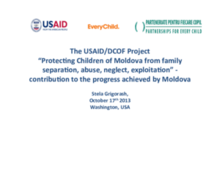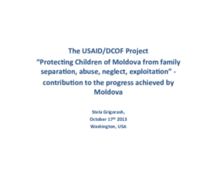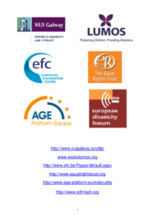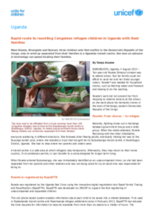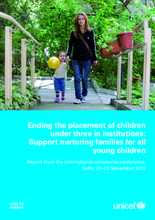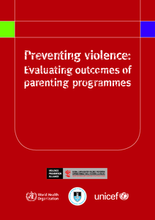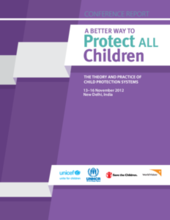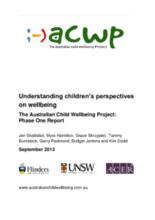Displaying 391 - 400 of 494
The first of two important presentations by Dr. Stela Grigorash, the Director of Partnerships for EveryChild Moldova, on the important work and lessons learnt in reforming the care system in that country.
The second of two important presentations by Dr. Stela Grigorash, the Director of Partnerships for EveryChild Moldova, on the important work and lessons learnt in reforming the care system in that country.
In this article for Prism Magazine, a publication of Evangelicals for Social Action, the authors ask challenging questions about the role of 'orphanage tourism', where Westerners visit or volunteer to work at a residential care center (orphanage) in the developing world, whether the trip is arranged by a tour or travel company, a nonprofit, or by a church.
This joint memo was issued by a group of European organizations to clearly state their belief that the draft language on community living in the proposed EU Structural Funds Regulations should be amended to enhance the effect and to better advance the rights of children, persons with disabilities, and older people.
This report provides a summary of work undertaken by Lumos - together with governmental authorities, international partners, local medical professionals and families - to ensure that all children born with hydrocephalus receive the life-saving treatment they need, and which is their fundamental human right.
RapidFTR is a versatile open-source mobile phone application and data storage system that seeks to expedite the Family Tracing and Reunification (FTR) process by helping humanitarian workers collect, sort and share information about unaccompanied and separated children in emergency situations so they can be registered for care services and reunited with their families.
This Report from the international ministerial conference, held in Sofia, 21–22 November 2012, entitled 'Ending the placement of children under three in institutions: support nurturing families for all young children', brings together the presentations, political commitments and priority actions identified by the participants, including 20 governments from Eastern Europe and Central Asia.
This report seeks to increase understanding of the need for, and the process of, conducting outcome evaluations of parenting programmes in low- and middle-income countries. The guidance is aimed at policy-makers; programme planners and developers; high-level practitioners in government ministries; representatives of nongovernmental and community-based organizations; and donors working in the area of violence prevention.
This report of a major conference held in New Delhi in November 2012 entitled “A Better Way to Protect ALL Children: The Theory and Practice of Child Protection Systems”, encapsulates the substantive content of the presentations and related discussion; provides an analysis and documents the journey; and suggest an agenda, or at least direction, for future work on Child Protection systems.
This document reports on Phase One of the Australian Child Wellbeing Project, a child-centred study in which young people’s perspectives are being used to design a major nationally representative survey of wellbeing among 8-14 year olds, and to interpret findings from that survey. It uses focus groups and in-depth interviews with young people in six groups who are often seen as experiencing high levels of marginalisation or as having particular experiences and needs, including young people living in out of home care and young people living with disability.

